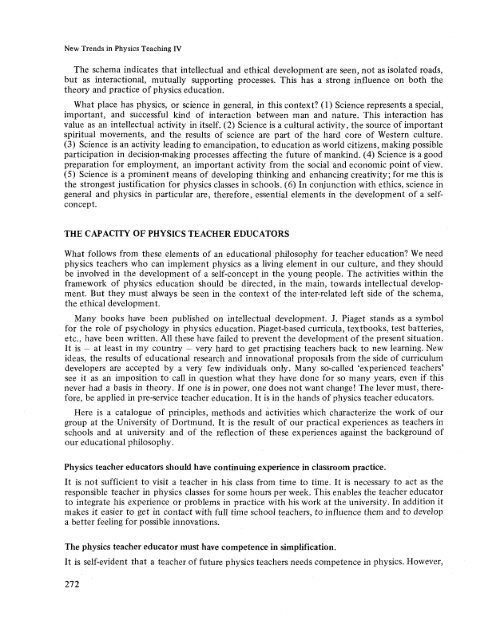New trends in physics teaching, v.4; The ... - unesdoc - Unesco
New trends in physics teaching, v.4; The ... - unesdoc - Unesco
New trends in physics teaching, v.4; The ... - unesdoc - Unesco
You also want an ePaper? Increase the reach of your titles
YUMPU automatically turns print PDFs into web optimized ePapers that Google loves.
<strong>New</strong> Trends <strong>in</strong> Physics Teach<strong>in</strong>g IV<br />
<strong>The</strong> schema <strong>in</strong>dicates that <strong>in</strong>tellectual and ethical development are seen, not as isolated roads,<br />
but as <strong>in</strong>teractional, mutually support<strong>in</strong>g processes. This has a strong <strong>in</strong>fluence on both the<br />
theory and practice of <strong>physics</strong> education.<br />
What place has <strong>physics</strong>, or science <strong>in</strong> general, <strong>in</strong> this context? (1) Science represents a special,<br />
important, and successful k<strong>in</strong>d of <strong>in</strong>teraction between man and nature. This <strong>in</strong>teraction has<br />
value as an <strong>in</strong>tellectual activity <strong>in</strong> itself. (2) Science is a cultural activity, the source of important<br />
spiritual movements, and the results of science are part of the hard core of Western culture.<br />
(3) Science is an activity lead<strong>in</strong>g to emancipation, to education as world citizens, mak<strong>in</strong>g possible<br />
participation <strong>in</strong> decision-mak<strong>in</strong>g processes affect<strong>in</strong>g the future of mank<strong>in</strong>d. (4) Science is a good<br />
preparation for employment, an important activity from the social and economic po<strong>in</strong>t of view.<br />
(5) Science is a prom<strong>in</strong>ent means of develop<strong>in</strong>g th<strong>in</strong>k<strong>in</strong>g and enhanc<strong>in</strong>g creativity; for me this is<br />
the strongest justification for <strong>physics</strong> classes <strong>in</strong> schools. (6) In conjunction with ethics, science <strong>in</strong><br />
general and <strong>physics</strong> <strong>in</strong> particular are, therefore, essential elements <strong>in</strong> the development of a selfconcept.<br />
THE CAPACITY OF PHYSICS TEACHER EDUCATORS<br />
What follows from these elements of an educational philosophy for teacher education? We need<br />
<strong>physics</strong> teachers who can implement <strong>physics</strong> as a liv<strong>in</strong>g element <strong>in</strong> our culture, and they should<br />
be <strong>in</strong>volved <strong>in</strong> the development of a self-concept <strong>in</strong> the young people. <strong>The</strong> activities with<strong>in</strong> the<br />
framework of <strong>physics</strong> education should be directed, <strong>in</strong> the ma<strong>in</strong>, towards <strong>in</strong>tellectual development.<br />
But they must always be seen <strong>in</strong> the context of the <strong>in</strong>ter-related left side of the schema,<br />
the ethical development.<br />
Many books have been published on <strong>in</strong>tellectual development. J. Piaget stands as a symbol<br />
for the role of psychology <strong>in</strong> <strong>physics</strong> education. Piaget-based curricula, textbooks, test batteries,<br />
etc., have been written. All these have failed to prevent the development of the present situation.<br />
It is - at least <strong>in</strong> my country - very hard to get practis<strong>in</strong>g teachers back to new learn<strong>in</strong>g. <strong>New</strong><br />
ideas, the results of educational research and <strong>in</strong>novational proposals from the side of curriculum<br />
developers are accepted by a very few <strong>in</strong>dividuals only. Many so-called ‘experienced teachers’<br />
see it as an imposition to call <strong>in</strong> question what they have done for so many years, even if this<br />
never had a basis <strong>in</strong> theory. If one is <strong>in</strong> power, one does not want change! <strong>The</strong> lever must, therefore,<br />
be applied <strong>in</strong> pre-service teacher education. It is <strong>in</strong> the hands of <strong>physics</strong> teacher educators.<br />
Here is a catalogue of pr<strong>in</strong>ciples, methods and activities which characterize the work of our<br />
group at the University of Dortmund. It is the result of our practical experiences as teachers <strong>in</strong><br />
schools and at university and of the reflection of these experiences aga<strong>in</strong>st the background of<br />
our educational philosophy.<br />
Physics teacher educators should have cont<strong>in</strong>u<strong>in</strong>g experience <strong>in</strong> classroom practice.<br />
It is not sufficient to visit a teacher <strong>in</strong> his class from time to time. It is necessary to act as the<br />
responsible teacher <strong>in</strong> <strong>physics</strong> classes for some hours per week. This enables the teacher educator<br />
to <strong>in</strong>tegrate his experience or problems <strong>in</strong> practice with his work at the university. In addition it<br />
makes it easier to get <strong>in</strong> contact with full time school teachers, to <strong>in</strong>fluence them and to develop<br />
a better feel<strong>in</strong>g for possible <strong>in</strong>novations.<br />
<strong>The</strong> <strong>physics</strong> teacher educator must have competence <strong>in</strong> simplification.<br />
It is self-evident that a teacher of future <strong>physics</strong> teachers needs competence <strong>in</strong> <strong>physics</strong>. However,<br />
272
















